Common Types of Adverse Actions Explained

Introduction and Understanding Adverse Action
The term “adverse action” plays a critical role in the employment process, especially when it comes to the background check procedure. It refers to a decision made by an employer that negatively impacts a candidate or employee, usually due to findings from a background screening. Adverse actions can have serious consequences for both job candidates and employees, as well as for employers who must navigate this process legally and fairly.
In this section, we will explore what constitutes an adverse action, how it impacts various stakeholders, and provide real-world examples to illustrate how adverse actions occur in the context of employment.
What is Adverse Action?
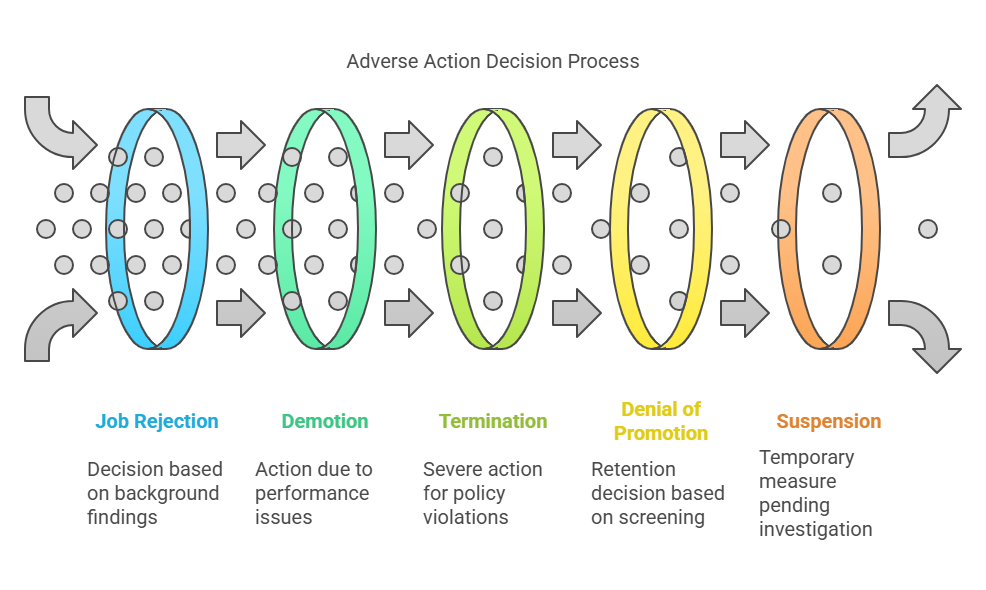
Adverse action is any decision made by an employer that can negatively affect a candidate’s or employee’s status based on information uncovered during the employment screening process. This action is often triggered by the findings in a background check, but it may also involve other factors such as the results of a drug test, a credit report, or performance evaluations.
Adverse actions are not limited to job applicants but can also apply to current employees if their background check reveals concerning information or if they experience other negative circumstances (such as legal issues, performance concerns, or behavioral problems). In most cases, adverse actions must be handled according to specific legal requirements, ensuring fairness, transparency, and the protection of the individual’s rights.
Common Examples of Adverse Actions
Some of the most common examples of adverse actions in the context of employment include:
- Job Rejection: If an employer decides not to hire a candidate due to findings in their background check—such as criminal history, credit issues, or discrepancies in their resume—that decision is considered an adverse action.
- Demotion: An employer may choose to demote an employee if their background check uncovers issues such as a revoked professional license, security clearance problems, or behavior that conflicts with the company’s values or regulations.
- Termination: In more severe cases, an employee might be terminated from their position due to adverse findings in their background screening, such as a criminal conviction or violation of company policies.
- Denial of Promotion or Salary Increase: Employers may decide against promoting an employee or granting them a salary increase if background screening results reveal issues that the employer deems relevant.
- Suspension: An employee may be temporarily suspended pending further investigation if a background check reveals concerning information, like pending criminal charges or policy violations.
While adverse actions are often a direct result of background checks, they can be influenced by a variety of factors, including organizational policies, the nature of the job, and the role’s level of responsibility.
Why Does Adverse Action Matter?
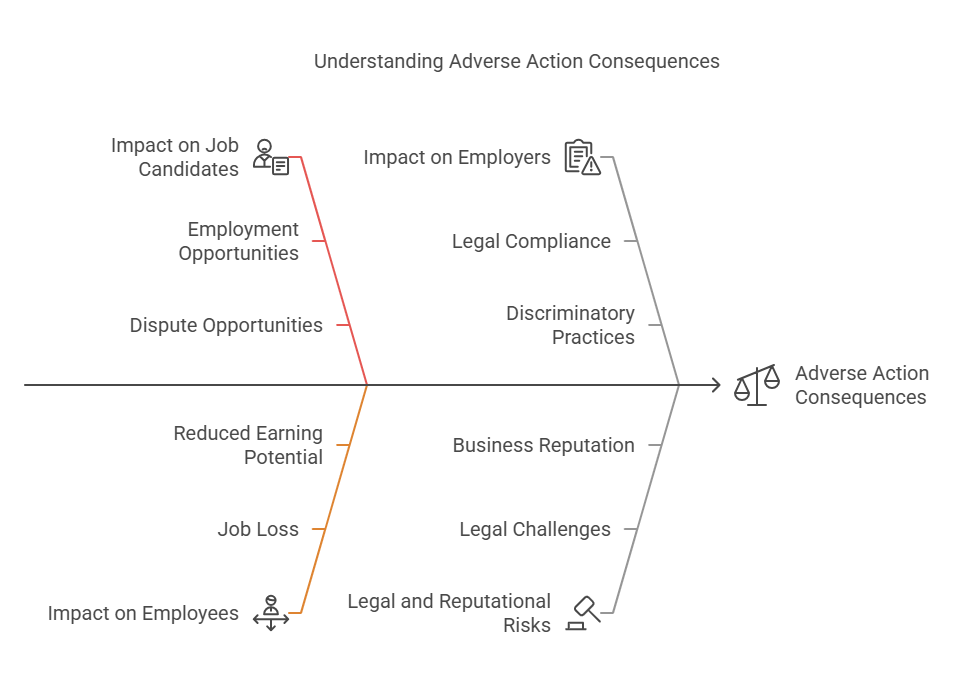
Adverse action matters for several reasons, both for the employer and the employee or job candidate. Let’s break it down:
Impact on Job Candidates
For job applicants, receiving an adverse action due to the results of a background check can be disheartening and challenging. It is essential for candidates to understand that adverse actions do not automatically mean they will be rejected or fired. In some cases, applicants may be given an opportunity to dispute or explain the findings.
However, adverse action can severely limit employment opportunities, especially if the reason for rejection or termination is related to issues that are difficult to resolve, such as criminal convictions or credit problems. These challenges are especially pertinent for individuals re-entering the workforce after incarceration or those with a history of financial hardship.
Impact on Employees
Employees can also face adverse actions if their employer uncovers something in their background check that impacts their role or job duties. This can lead to disciplinary action, demotion, or termination. For employees, the key concern is the impact on their career and livelihood, as an adverse action may result in job loss, loss of seniority, and reduced earning potential.
Impact on Employers
For employers, adverse actions are not just a matter of policy but also legal compliance. They must follow strict regulations when making decisions based on background checks. Employers should also be cautious when making adverse decisions to avoid discriminatory practices. Failing to comply with the Fair Credit Reporting Act (FCRA) or similar laws could expose the employer to legal challenges, penalties, or lawsuits.
Employers must carefully consider each adverse action’s legal ramifications and how it may impact their business reputation and employee morale. Fair, transparent processes are critical to maintaining a positive work environment and ensuring compliance with applicable laws.
The Role of Background Checks in Adverse Actions
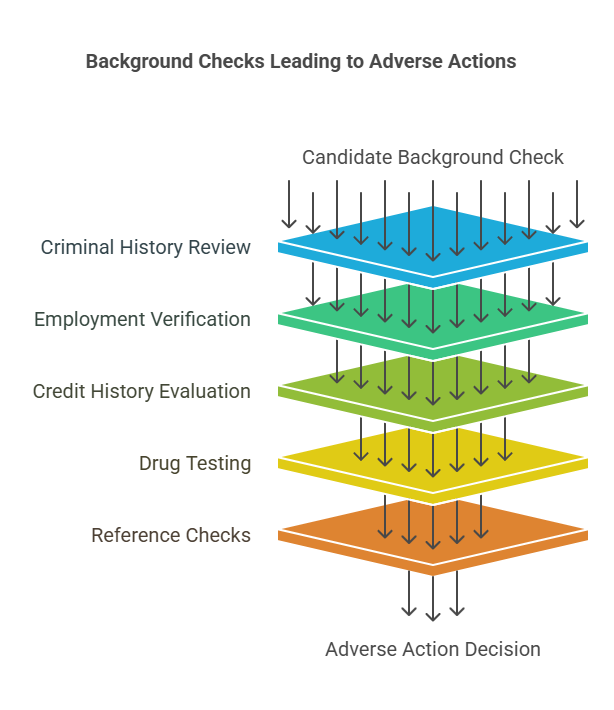
Background checks are a fundamental part of the adverse action process, providing employers with a comprehensive view of a candidate or employee’s history. However, background checks are not without their challenges. Understanding how background screening plays into the decision to take an adverse action is critical.
Here are some of the key components of a background check that may trigger an adverse action:
Criminal History
Criminal records are one of the most common reasons for an adverse action. Depending on the type of job, an employer may reject a candidate or terminate an employee based on criminal convictions or pending charges. It is important to note that employers may not consider all offenses to be disqualifying. For instance, a minor infraction or an old conviction might not disqualify an applicant, but serious offenses (e.g., violent crimes or financial fraud) often will.
Employment History Discrepancies
Background checks often verify an applicant’s previous employment. If discrepancies are found—such as lying about job titles, dates of employment, or reasons for leaving previous jobs—employers may take adverse action, as honesty and integrity are crucial to most positions.
Credit History
Certain jobs, particularly those involving financial transactions, security, or access to sensitive information, may require an evaluation of a candidate’s credit history. Negative credit history (e.g., bankruptcies, collections, or large amounts of debt) may trigger an adverse action, as it could suggest financial irresponsibility or an increased risk of fraud.
Drug Testing and Substance Use
Drug tests are often part of background checks, particularly in safety-sensitive industries. A failed drug test can result in an adverse action, such as rejection for employment or termination for existing employees.
Reference Checks
Although not strictly part of a formal background check, employer reference checks can influence an adverse action. If a reference reveals concerns about the candidate’s reliability, work ethic, or behavior, employers may use this information to take adverse action.
How Adverse Actions Relate to Employment Screening and Our Services
In Part 1, we discussed the concept of adverse action and its impact on job candidates, employees, and employers. Now, let’s delve deeper into the connection between adverse actions and employment screening, exploring how employers use the information obtained during background checks to make these critical decisions. We will also discuss the legal requirements that govern the process, ensuring that employers follow fair and compliant practices.
Additionally, we will explore how Exact Background Checks can support employers in conducting thorough, reliable, and legally compliant screenings to mitigate risks and streamline the adverse action process.
How Adverse Actions Relate to Employment Screening
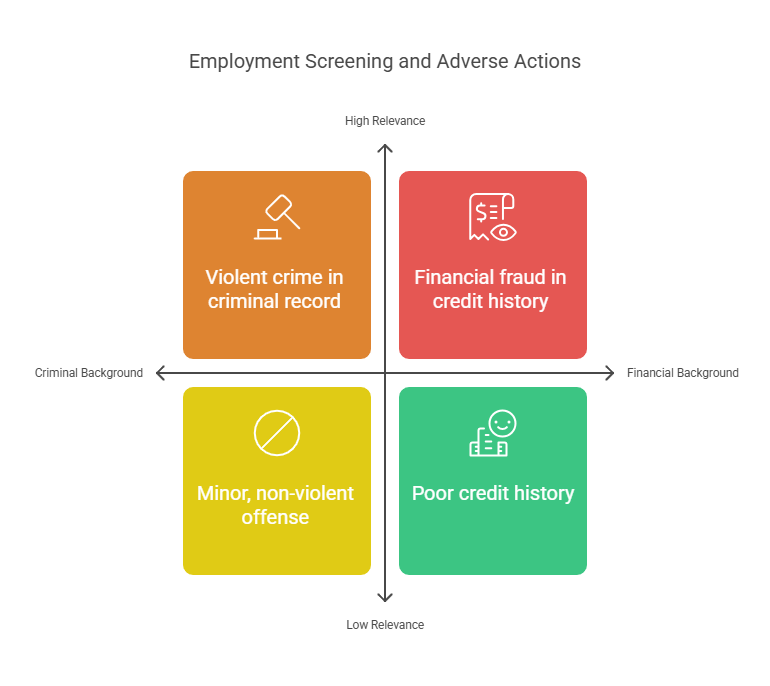
Employment screenings, including background checks, drug tests, and other assessments, are essential tools that employers use to evaluate a candidate’s or employee’s history. These screenings provide valuable insights into an individual’s qualifications, integrity, and suitability for a role. However, sometimes the information revealed in these screenings may lead employers to take adverse action.
While employers may use background check findings to inform hiring decisions, they must handle this information carefully and follow legal protocols to ensure compliance and fairness. Adverse action is usually triggered by specific findings within these screenings that raise concerns or pose risks to the employer or organization.
Let’s break down how employment screenings tie into adverse actions:
Criminal Background Checks and Adverse Actions
One of the most common reasons for adverse actions is a criminal background check. Criminal convictions, especially for offenses that are directly related to the job or safety concerns, can lead to job rejection, demotion, or termination. For instance, employers hiring for positions involving sensitive information, access to financial resources, or roles that require high levels of trust and integrity (e.g., positions in law enforcement, healthcare, or education) may disqualify candidates with criminal records that indicate dishonesty or violence.
However, employers must consider the nature of the offense, the time that has passed, and the relevance to the job before deciding to take adverse action. For example, a minor, non-violent offense from many years ago may not disqualify an applicant, but a recent conviction for a financial crime may raise red flags for positions involving handling money.
Legal Guidelines for Criminal History Disqualification
Under the Equal Employment Opportunity Commission (EEOC) guidelines, employers are advised to use the individualized assessment process when considering criminal history during hiring decisions. This involves evaluating the nature of the crime, its relevance to the job, and how long ago it occurred. The EEOC also emphasizes that employers should avoid blanket policies that automatically disqualify candidates with criminal records, as this could lead to discriminatory practices.
Employers must also provide candidates with an opportunity to explain or dispute criminal records before making a final adverse action decision.
Credit History and Financial Background Checks
Many employers, particularly in industries such as finance, government, and healthcare, may conduct credit history checks to evaluate a candidate’s financial responsibility. A poor credit history—such as bankruptcies, large amounts of debt, or financial fraud—could trigger an adverse action, especially if the role involves managing finances, handling sensitive client data, or overseeing corporate assets.
While a candidate’s financial background may be relevant to certain positions, employers must be careful not to use credit history as an automatic disqualifier for all applicants. Under the Fair Credit Reporting Act (FCRA), employers must follow certain steps, including obtaining written consent from candidates before conducting a credit check. They must also provide candidates with a copy of the credit report and a pre-adverse action notice if they intend to reject a candidate based on the credit report.
Drug Testing and Adverse Actions
Another crucial part of many employment screenings is drug testing. Employers often require candidates or employees to undergo drug tests to ensure a safe and productive workplace, especially in industries that involve high-risk activities, safety-sensitive positions, or public safety.
A failed drug test is a clear reason for an adverse action, including job rejection, suspension, or termination, depending on the employer’s policies and the severity of the situation. However, employers must comply with state and federal regulations regarding drug testing, ensuring that the tests are conducted fairly and that employees’ privacy rights are respected.
Employers also need to consider the timing and type of drug used. For instance, certain drugs may remain detectable in a person’s system for a longer period, and employers should take into account factors like prescription medications or medical marijuana use before deciding to take an adverse action based on drug test results.
Legal and Procedural Aspects of Adverse Actions
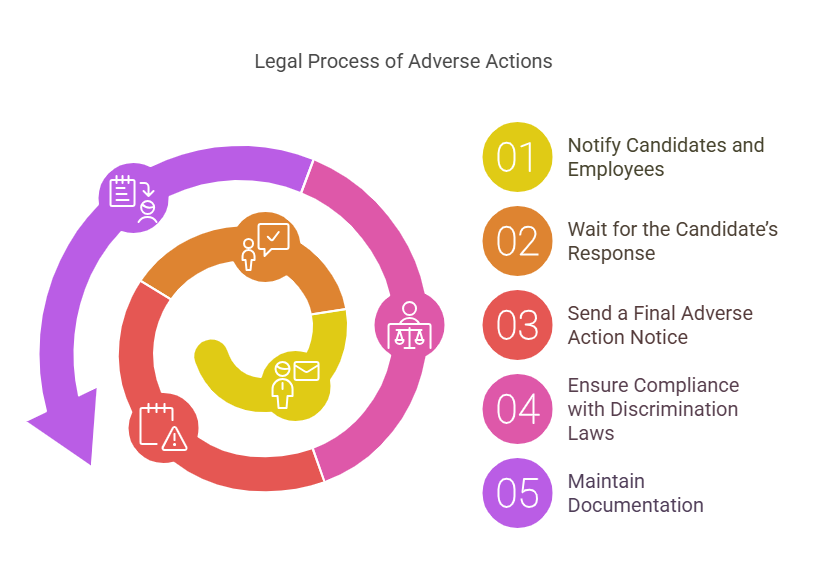
The process of taking an adverse action is governed by several important legal requirements. Employers must follow specific steps outlined by the Fair Credit Reporting Act (FCRA) and other regulations to ensure that they are conducting screenings and making adverse decisions lawfully and fairly.
The FCRA and Adverse Actions
The Fair Credit Reporting Act (FCRA) is a federal law that governs the use of background checks, credit reports, and other consumer reports for employment purposes. The FCRA outlines strict guidelines that employers must follow when taking adverse actions based on background check results.
Under the FCRA, employers are required to:
- Notify Candidates and Employees: If an employer intends to take an adverse action based on information in a background check, they must first notify the individual, providing a pre-adverse action notice. This notice should include a copy of the background check report and a summary of the individual’s rights under the FCRA.
- Wait for the Candidate’s Response: After providing the pre-adverse action notice, the employer must wait a reasonable period (usually five to seven days) to allow the candidate to dispute or explain any discrepancies or errors in the background check.
- Send a Final Adverse Action Notice: If the employer proceeds with the adverse action, they must send a final adverse action notice. This notice must include a summary of the background check, the contact information of the agency that provided the report, and the individual’s right to dispute the report’s accuracy.
Equal Employment Opportunity Considerations
Employers must also ensure that their adverse action decisions do not violate discrimination laws under Title VII of the Civil Rights Act of 1964. This law prohibits employers from discriminating against candidates based on race, color, religion, sex, or national origin. Additionally, under state and local laws, employers may be prohibited from using certain background check results (such as arrests that did not lead to convictions) to take adverse actions.
Timing and Documentation
In addition to legal considerations, timing and documentation are crucial for employers when handling adverse actions. Employers should maintain clear records of each step in the adverse action process, including the pre-adverse action notice, any communications with the candidate, and the final decision. This documentation will serve as evidence in the event of any disputes or legal challenges.
Exact Background Checks and Our Services
At Exact Background Checks, we understand the importance of conducting thorough, legal, and transparent background checks to help employers make informed decisions. We offer a range of employment screening services that provide employers with accurate, reliable information to support the hiring process.
How We Help Employers with Adverse Action Compliance
Our comprehensive background screening solutions include criminal background checks, credit checks, drug testing, and more. By leveraging our services, employers can:
- Ensure Legal Compliance: We help employers navigate the complexities of federal, state, and local regulations, including the FCRA and EEOC guidelines, ensuring that adverse actions are taken within the boundaries of the law.
- Improve Fairness: Our background checks provide employers with clear, objective information, allowing them to make decisions based on facts rather than assumptions. We promote fair practices by ensuring that all candidates are treated equally during the screening process.
- Save Time and Resources: Our efficient processes and expert team reduce the time and effort required to conduct background checks, allowing employers to make faster, more informed decisions.
- Minimize Risks: With our reliable background screening services, employers can reduce the risk of hiring individuals who may pose potential safety, security, or compliance risks, thus protecting their business.



